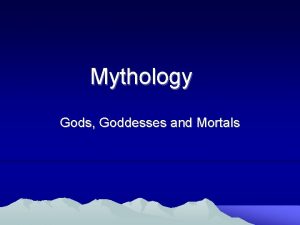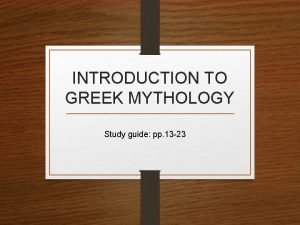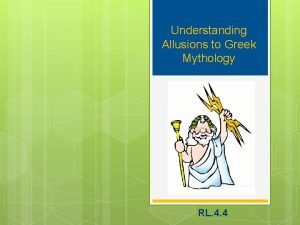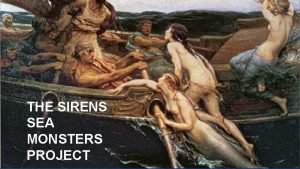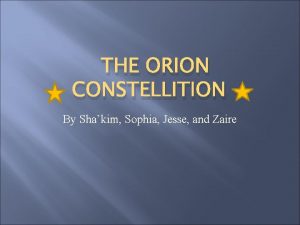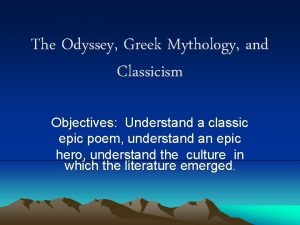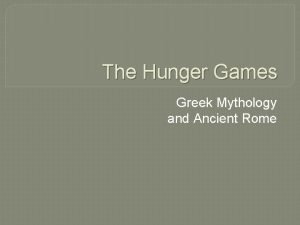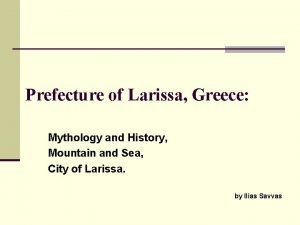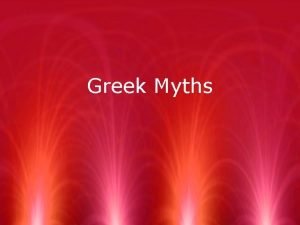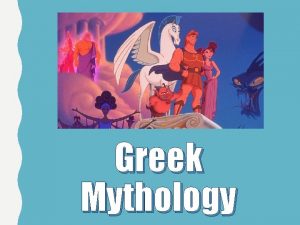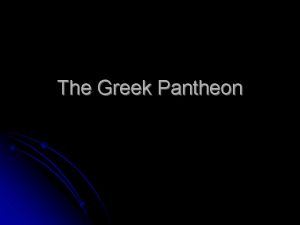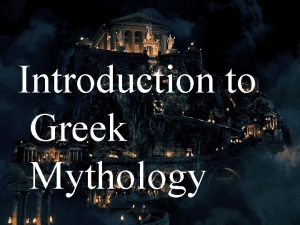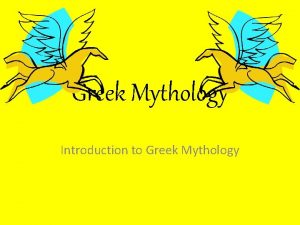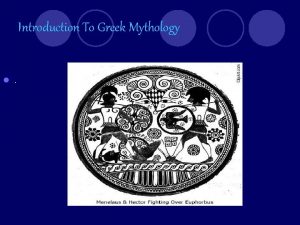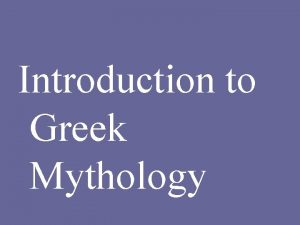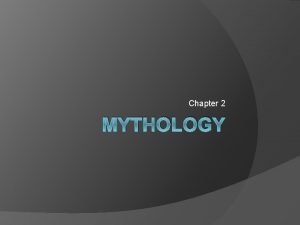Introduction to Greek Mythology Mythology in Most Primitive














- Slides: 14

Introduction to Greek Mythology

Mythology in Most Primitive cultures horror; magic; human sacrifice n Gods had no resemblance of reality n

The Bestial Gods in Egyptian Mythology

The Bestial Gods in Egyptian Mythology

The Bestial Gods in Egyptian Mythology

The Bestial Gods in Egyptian Mythology

The Particularity of Greek Mythology: The Greeks made their gods in their own image. n Mankind became the center of the universe. n The universe became rational. n The ancient Greeks were preoccupied with the visible; they were finding the satisfaction of their desires in what was actually in the world around them. Ex. Apollo as the fulfillment of their search for beauty. n

Olympus Human gods naturally made heaven a pleasantly familiar place. n Zeus as a capital figure of fun n Hera as stock character of comedy n Such stories made for a friendly feeling. n Laughter—perfectly natural in Olympus— made the gods companionable. n

The Deities’ Residence on Earth On earth, the deities were exceedingly & humanly attractive. n A humanized world, men freed from the paralyzing fear of an omnipotent Unknown. n The ancient Greek mythmakers disliked the irrational and had a love for facts. n Even the most non-sensical take place in a world which is essentially rational & matter-of -fact. n

The Features of Greek Mythology A familiar local habitation gave reality to all the mythical beings. n The terrifying irrational has no place in it: n No magic: Circe & Medea two exceptional figures n There are stories about stars; but we see no trace of their influence on human lives. n

The Features of Greek Mythology Ghosts never appear on earth. n The Greeks were not afraid of the dead: “the pious dead” in the Odyssey n The world of Greek mythology was not a place of terror for the human spirit. n The whole divine company were entrancingly beautiful with a human beauty. n The early Greek mythologists transformed a world full of fear into a world full of beauty. n

Some Dark Spots in this Bright Picture Gods often acted in a way no decent man or woman would. n A very limited sense of right & wrong prevailed in Homer’s heaven. n

Some Dark Spots in this Bright Picture These are features shared with other primitive cultures; however, they are so few in comparison. n Traces of a time when there were beast-gods: Satyrs & Centaurs. n Shadows of human sacrifice. n Mythical monsters to glorify heroes: Gorgons; hydras (九頭海蛇怪); chimeras (吐火獸) n

The Significance of Greek Mythology Early science: An explanation of something in nature; ex. the cause of thunder & lightning. n Pure entertainment n Early literature n A tint of religion: (but not so thick as the Hebrew Bible) n The evolution of human civilization n
 Data structure primitive and non primitive
Data structure primitive and non primitive Data structures
Data structures What is the greek miracle in greek mythology
What is the greek miracle in greek mythology Difference between primitive and classical mythology
Difference between primitive and classical mythology Greek mythology hierarchy
Greek mythology hierarchy Greek mythology
Greek mythology Sirens facts
Sirens facts Orion meaning
Orion meaning Objective of greek mythology
Objective of greek mythology The hunger games and greek mythology
The hunger games and greek mythology Greek mythology 100 arms
Greek mythology 100 arms Larissa mythology
Larissa mythology Storge greek mythology
Storge greek mythology Herophilus greek mythology
Herophilus greek mythology Half woman half snake greek mythology
Half woman half snake greek mythology


